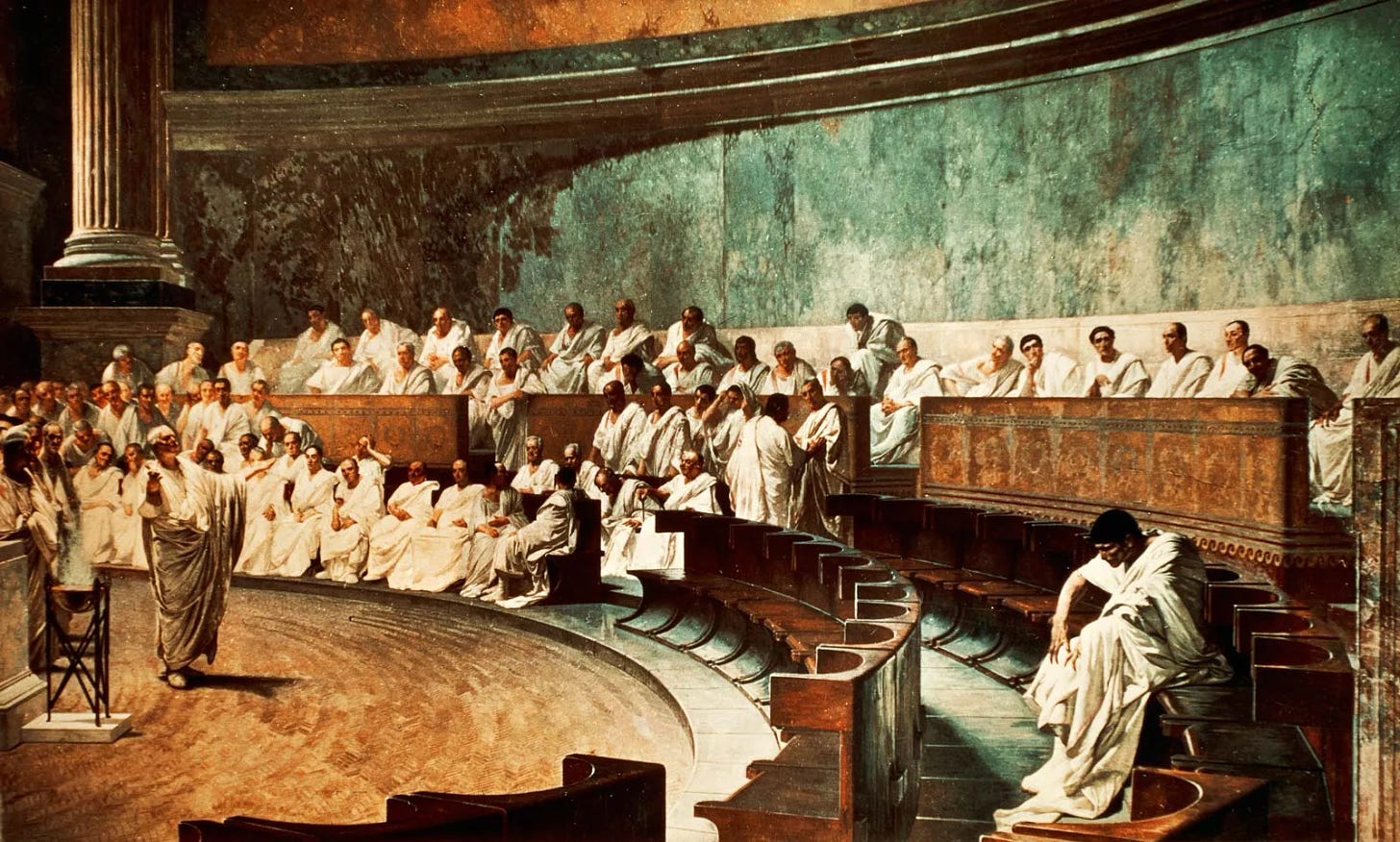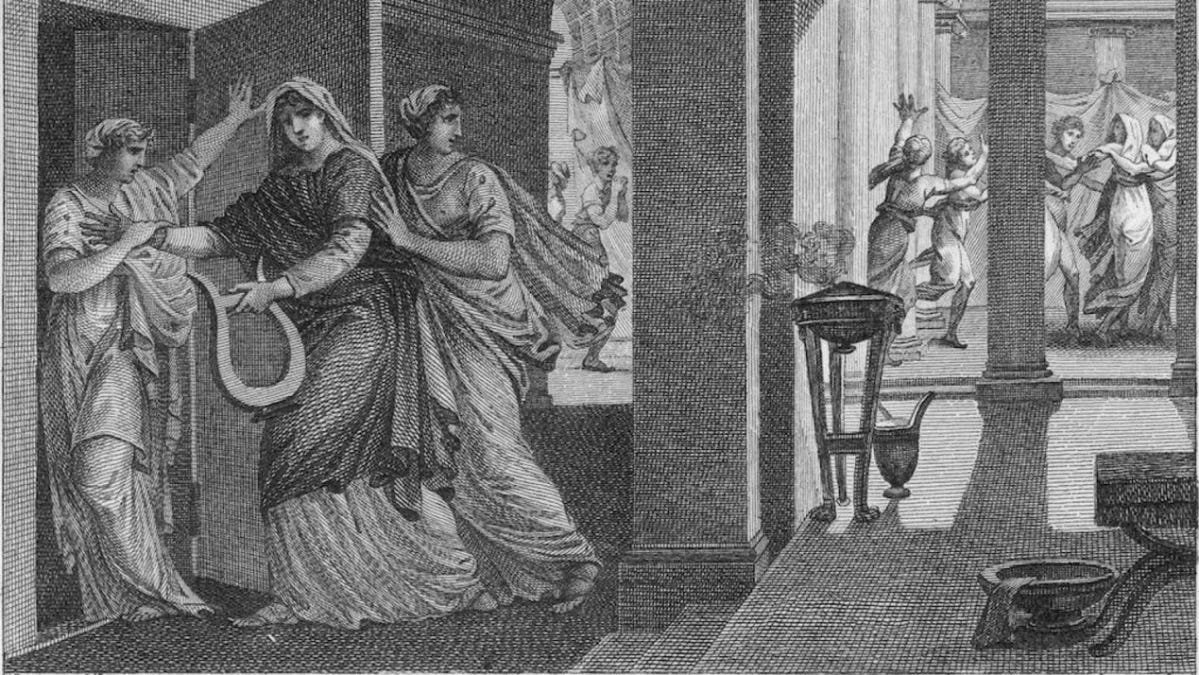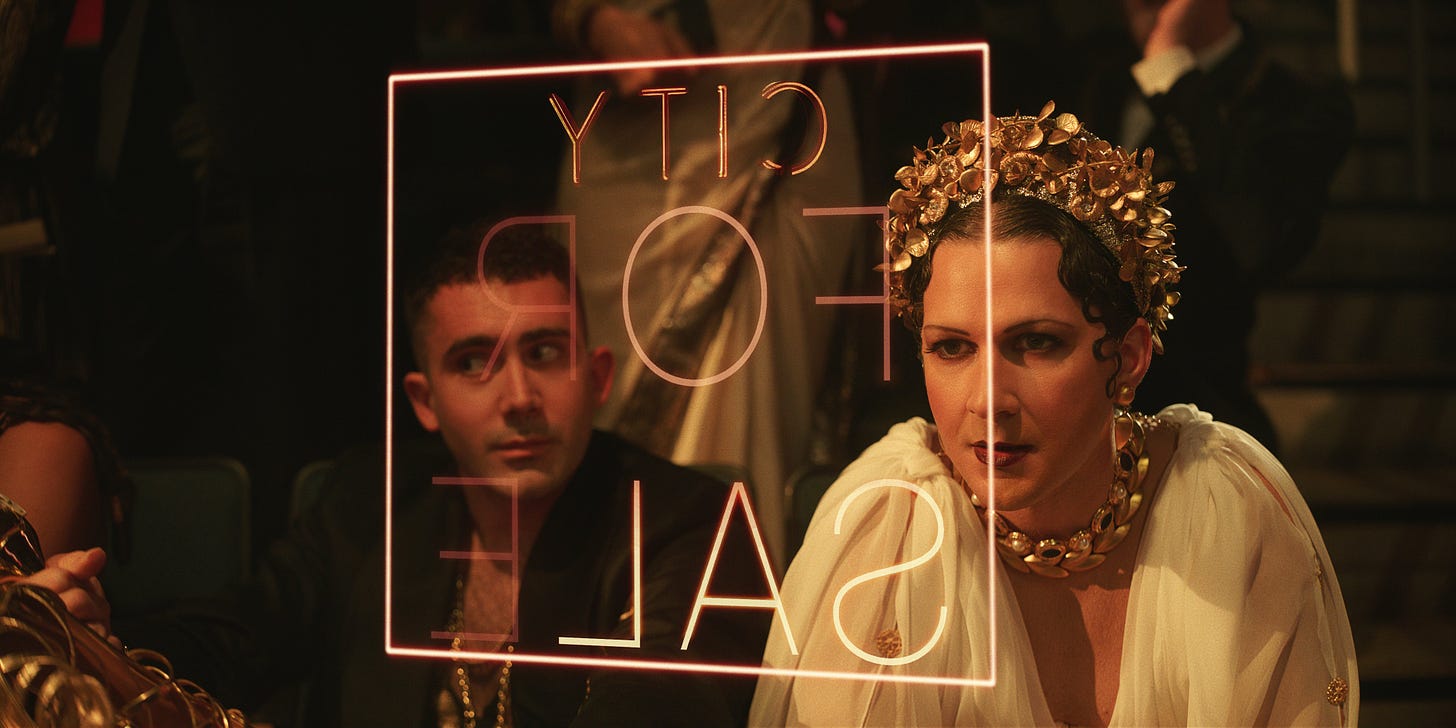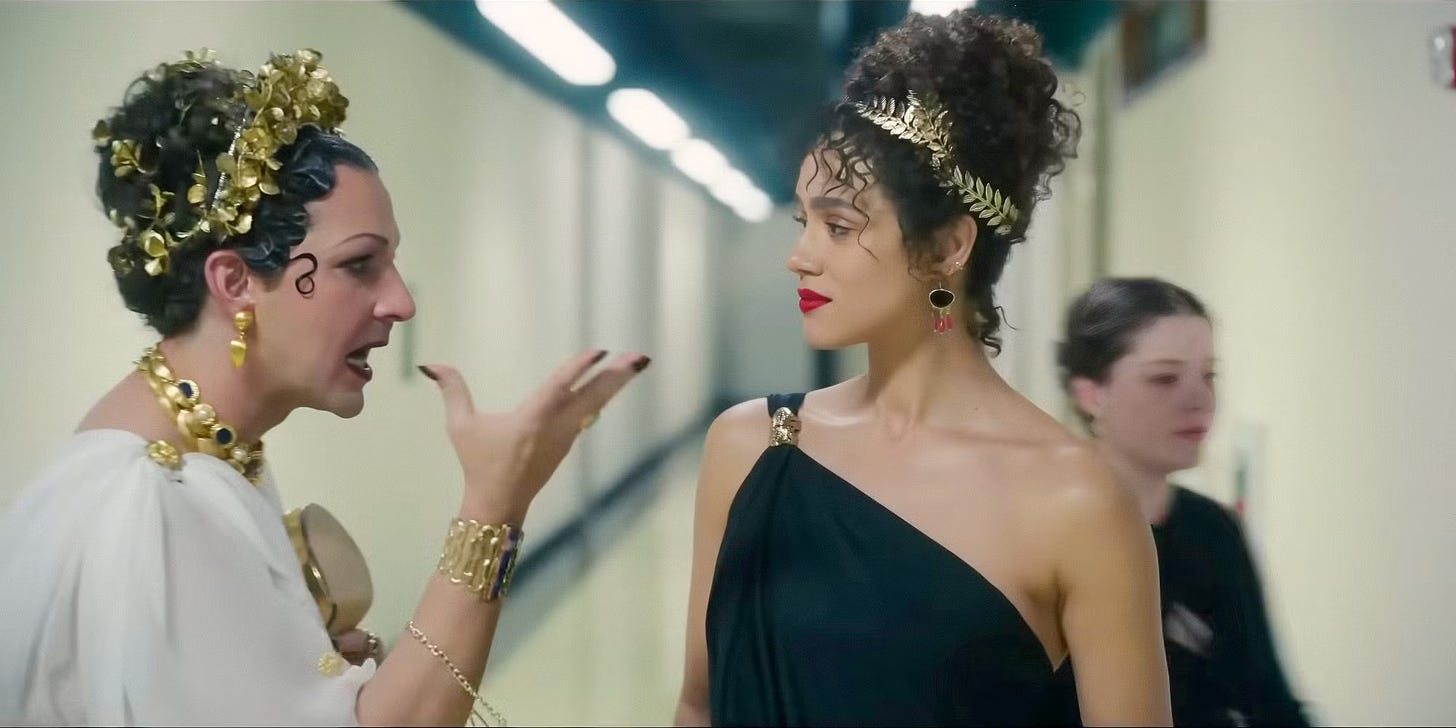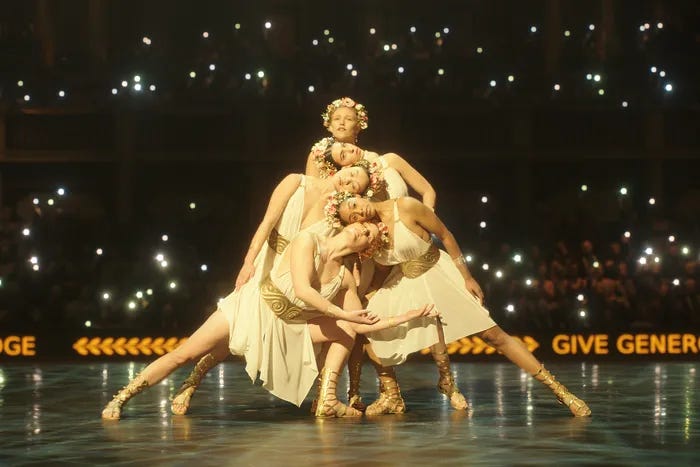A New Rome in Megalopolis
Sifting through the wreck of this movie to find some classical threads
Look, I’m not going to write a full review of this film. It’s maddening, clearly the culmination of too much work and time in Francis Ford Coppola’s life, and just impossible to encapsulate without seeing it. I’ve been twice and I still can’t put it in words. I’m not going to recommend you do or don’t see it - rather I thought I’d draw out some of the key Classical threads that Coppola has woven into the film, among many, many other random homages and nods.
The content below will have spoilers for the film, but it won’t particularly make much cohesive sense (even if you’ve seen it to be honest). Regardless, I’ve tried to group it around some of the people and events that are direct or indirect references to the world of Ancient Rome.
Catiline and Cicero
The heart of the movie centres around the rivalry between ‘Cesar Catilina’ and ‘Franklyn Cicero’, which essentially parallels the great conflict known as the ‘Catilinarian Conspiracy’ in 63 BC. For a little bit of context, Marcus Tullius Cicero was elected consul (the highest political office in Rome) for that year, and Lucius Sergius Catilina missed out for the third time. His frustration allegedly led him to gather a band of conspirators together and plot to march on Rome with an army, kill Cicero and other opponents, and cancel the huge debts he had amassed. Cicero gave a series of speeches to the Senate denouncing Catiline, revealing his apparent plans, and essentially forcing him to flee Rome, fight against them and die in battle. It was Cicero’s crowning glory of his career.
Now Coppola has made it clear several times that he envisioned re-telling this story not only through the lens of modern America, but also from Catiline’s perspective. History readily recalls Cicero’s words and motivations, as he published many of them, but the truth is not truly known for certain. So in Megalopolis, we see it all from Catilina’s viewpoint - and his motives are true, fighting for progress and relief for the poor, and the scandals thrown against him turn out to be false (more on this later). In this way, Coppola flips the story on its head and Cicero comes across as stubborn, conservative and malicious.
While it would be great to say this is well executed, it is not. The general idea runs through the film but so often gets lost in the manifold other plot lines and threads Coppola attempts to include. We lose a bit of the moral message of the story, if there was one, but it is nevertheless important to know this underpins everything else which goes on around it. And spoiler alert - they just kind of happily reconcile in the last 3 minutes of the film!
Clodio and Clodius
One of the more frantic characters in the film is that of Clodio Pulcher, an agent of chaos and a calculating opportunist, played by the mercurial Shia Labeouf. He is a cousin of Catilina, by virtue of their mutual relation Crassus (see below), and is, at least for the first part of the film, in love with Julia, Catilina’s love interest. Now if you know the time of Cicero well, the name will be familiar - he is named after the rabble-rouser Publius Clodius Pulcher, an enemy of Cicero who was similarly frantic in his political dealings in Rome. He made use of public mobs to gain great power and influence among the more respectable politicians, and was deeply populist in his policies. This would also see him killed in a riot when his mob fought with a rival’s men - which is another parallel in this film.
In Megalopolis, Clodio functions on different levels and drives various disconnected plot developments. His infatuation with Julia leads him to follow Catilina for a while, before he switches to trying to have him humiliated by using a deep-fake video to stir up scandal, before becoming a nazi-adjacent demagogue and then attempting a business take-over of Crassus’ bank. It’s a lot!! Also at one point he gets shot in the butt with an arrow, which is genuinely funny, before being strung up by the mob like Mussolini in a completely different scene.
Probably the most interesting moment for his character though is the indirect reference to the Bona Dea scandal, where Clodius snuck into a sacred female-only event, hosted by Julius Caesar’s wife, dressed as a woman. He was, naturally, discovered and it caused a minor scandal which saw him prosecuted - though with a healthy amount of bribery he escaped conviction. In the film, Clodio attends the nuptial celebrations of Crassus and - please wait for it, because this is the actual name of a character - Wow Platinum, where he plays the aforementioned deep-fake video. In the scene he is dressed as a very elegant Roman woman, hair and heels and all (Shia absolutely nails it, to be honest) and even gets out the great line “revenge tastes best in a dress”. It’s a neat nod to the scandal that sums up who Clodius was in Ancient Rome.
Supporting Characters
A few other characters appear as references to Roman figures (there are plenty of other ones who many be references to other times, places, genres or dreams Coppola had, but that much is beyond me). Hamilton Crassus III is the super-wealthy bank owner who is also uncle to Catilina and grandfather to Clodio, and is of course mainly interesting because of his immense wealth. He is, no doubt, a direct reference to Marcus Crassus, the wealthy Roman who formed one leg of the First Triumvirate with Pompey and Caesar, and was known especially for his enormous wealth. Beyond the obvious details though, there isn’t a huge amount more of him that is linked to the character - alas we do not get to see John Voight drown in molten gold.
Cicero’s daughter Julia is another character of note, who starts the film as a party girl baring all in the newspapers, before suddenly becoming a love interest for Catilina as his assistant (?) and dropping any hint of her previous party lifestyle. She also spends some of the film recording information and tailing him in a noir-style plot which is completely dropped when she becomes his lover and, suddenly, the mother of his child. She eventually helps Catilina and Cicero reconcile by… giving birth I guess. The wild, party-loving aspect of her character, alongside the name Julia, suggest perhaps a connection to Julia the Elder, who was Augustus’ daughter, famous for allegedly sleeping with half of Rome in an act of rebellion against her father. If you haven’t seen this all-timer scene from I Claudius, I implore you watch this now.
Accusations Against Catiline
One of the Roman Cicero’s great accomplishments was his character assassination of Catiline in his great speeches, much as he did with Marcus Antonius decades later in the Philippics (though the outcome was not so favourable that time). Coppola picks up on two major accusations that were thrown at Catiline. First, he was accused of killing his wife to make room for another. While we know Catiline’s wife did die, we can never know for sure whether he actually did such a thing. In Megalopolis, Catilina’s wife is also dead and her death is the subject of some mystery throughout the movie, as her body was never found - until Cicero reveals near the end (for some reason?) that she actually was found but identified as a Jane Doe, and he had kept this all hidden.
The second accusation picked up on was that he had slept with a Vestal Virgin, a sacrilegious act that Catiline may have been prosecuted for but was never found guilty of. In the film, the deep-fake video that Clodio presents show Catilina in flagrante delicto with Vesta, a teen pop sensation whose whole deal is virginity and is used to raise millions of dollars for… actually I don’t know if they ever say what for. The moment is a nice nod to this, if a little overdone.
Latin Literature
There are a few neat little references to Latin literature throughout the film, some more prominent than others. The most obvious one is when, right after the Vesta video plays to the crowd, Cicero begins to speak out against Catilina using the words of the Roman Cicero’s own famous Catilinarian oration. To anyone who has had the joy of translating it, the words leap out at once - though they jump back and forward around the speech to cherrypick the phrases that best suit the occasion. It’s a nice touch though a little forced in its execution.
Alongside this, we see Clodio recite Catullus 85, the famous ‘odi et amo’ poem to Julia early on, in an attempt to woo her. It’s an early indication of the varied array of references we are to expect as we go. It’s also a good summation of how I feel about the film… Much later, Julia quotes Marcus Aurelius several times, during a break from a game of cards in which we never see anyone actually play any cards… And though not Roman, we do also get a neat quote from Sappho too! All of this is alongside direct quotes from other epochs, like Catilina giving a full rendition of Hamlet’s “to be or not to be” at an early juncture, for no apparent reason, as well as more indirect references, such as nods to George Bernard Shaw’s Pygmalion and… who knows what else. The film feels like a ramshackle pinterest board of every little influence Coppola enjoyed in his career and it would be a Sisyphean task to try and track them all.
Roman Flavour
The city of the film is called ‘New Rome’ though it is clearly just New York with a few more Roman bits. Allusions to Rome include toga-like garments that some characters wear, sometimes (Catilina spends about half the film taking off or putting on various coats, capes and shawls); a Saturnalia celebration that is seemingly just Halloween + Christmas and a few other religions thrown in too; Madison Square Gardens is now a Colosseum/Circus Maximus type arena; the Cleopatra costume that Wow Platinum wears and then (spoilers) is killed in; and even, in some random moments, Latin spoken or written on signs. There’s a lot more I’ve probably missed but I don’t think I can sit through the whole thing again because I gotta go back to the clubbbb…
Have you seen it? What on earth did you make of it? Any references I’ve missed? Leave a comment!



